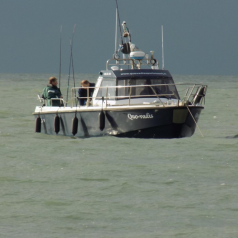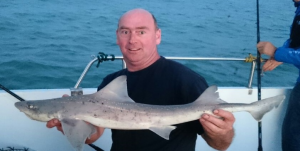
Sjef Mathijssen is the owner of the charter boat Quo Vadis and one of the captains that dedicates himself to tagging starry smooth hounds in the Dutch Eastern Scheldt.
First off, tell us more about yourself!
My name is Sjef Mathijssen, I am 54 years old, married and living in Colijnsplaat (the Netherlands). That is also were my boat, the Quo Vadis, is located. I started fishing at a young age since I always found peace near the water. I fished on a reasonable level and participated in competitions both from shore and on boats. The Dutch Angling Association even gave me the chance to go abroad and compete in world fishing championships. But sometimes you just have too much on your plate, and that is when I started to work more on my own boat. In addition to my job as a plastic welder, I try to spend as much time on my boat as possible. It doesn’t really matter where I fish, it is all about the sport, the factor of the unexpected and the time to relax. Through the years I have learned a lot about what the sea and the Eastern Scheldt have to offer. That is also how I got the knowledge about catching sharks. I have been doing that for several years now and with my work I contribute to an ongoing research study. I am always keen to share my knowledge with others and it makes me happy if the people on the boat are happy. Up until now, I have seen smoothhound sharks, tope sharks, and even hammerhead sharks. That is what we do it for!
How are you involved with the Dutch Caribbean Shark Week?
Together with other recreational fishing boats, me and my boat have been participating in an ongoing project of the Dutch Angling Association studying sharks in the Netherlands for several years now. I was contacted by Save Our Sharks to organize a trip during Dutch Caribbean Shark Week this year to give people in the Netherlands the opportunity to see a shark, and to contribute to the ongoing research. I also participate in an event called Shark-atag, which is organized by he Dutch Angling Association. For events like this, I normally organize additional boats and bait for the fishing.
Why did you get involved with Shark Week here in the Netherlands?
Sharks are amazingly interesting animals and it is truly interesting to know where these sharks go after you catch them. What distances do they swim and how fast do they grow? That is the reason why I tag the shark, register the animal, check its health and then release it back into the sea. That is how we get a unique insight in the Dutch shark population, and fortunately we were able to release a lot of sharks already! Also, I teach the people on the boat what tagging is and why we do it, making them more aware of the work we do. It is nice to be able to tell from my own experience that a shark caught on my boat was the first shark to be recaptures in Dutch waters.

What is the most memorable moment you had with a shark or ray?
We’ll never know if it was a shark or a ray. I got a good bite near Neeltje Jans, but as soon as I wanted to reel it in, it escaped. It is part of the sport to have an animal pulling at your line and never knowing what is (or was) on the other end of it.
What shark or ray species is at the top of your bucket-list right now?
I think all sharks and rays are absolutely beautiful animals. They are so strong, mostly being made up of muscles! Whenever I see a television shows starring sharks, I always get eager to see the animals in real life.





